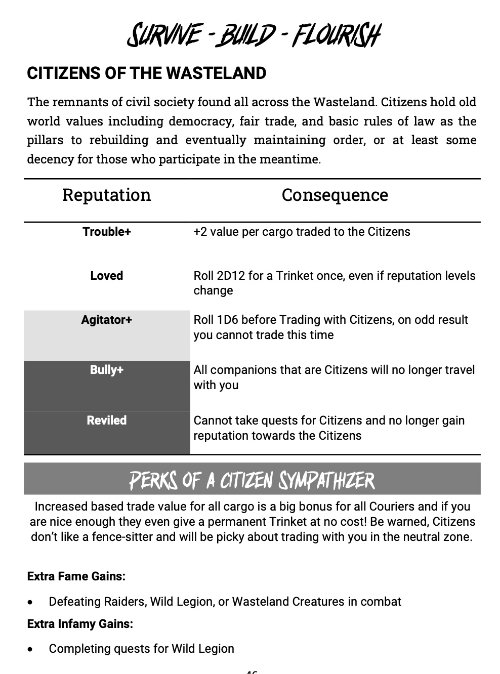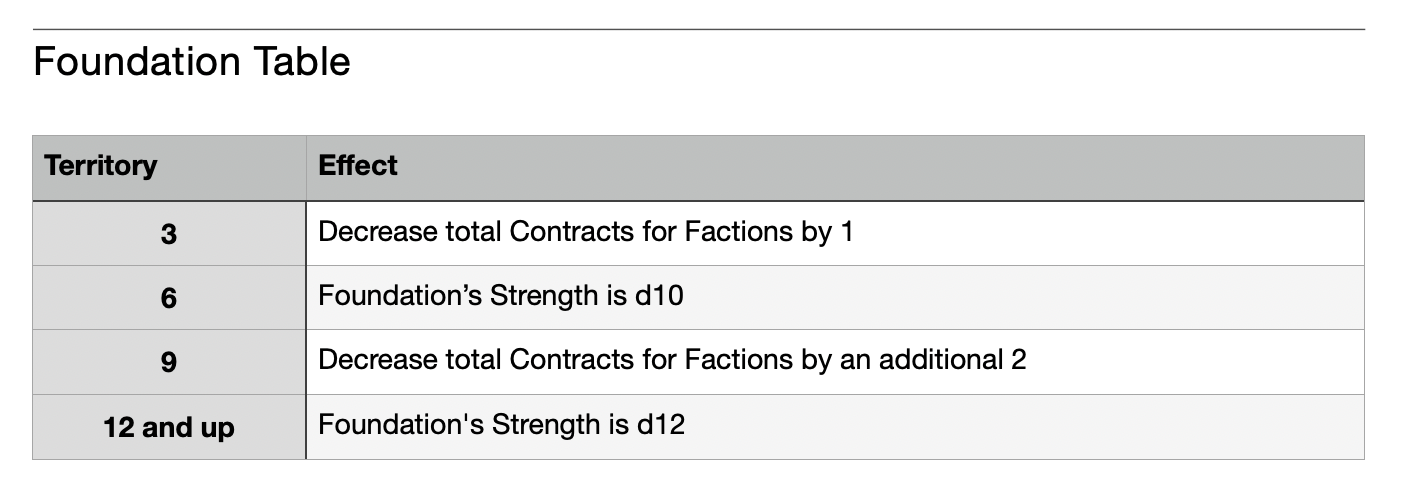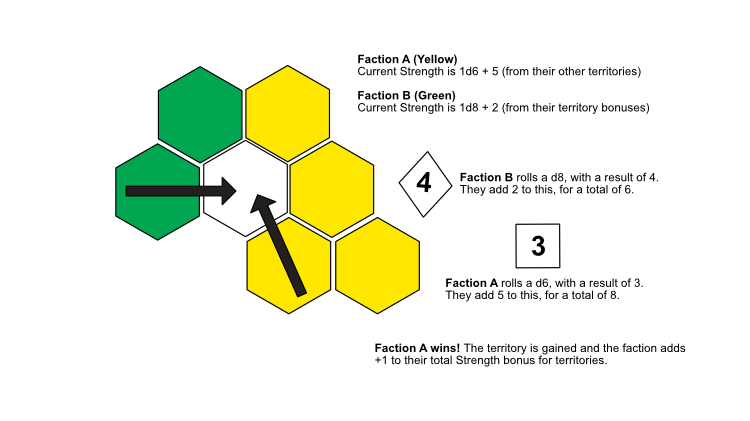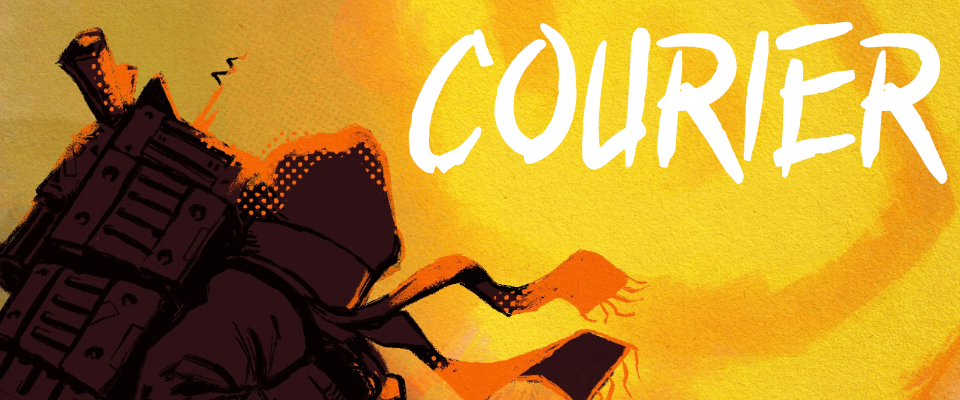Factions, Tensions, and The Wasteland
Welcome to the first devlog for Courier - Repacked edition!
To start off the devlogs I've chosen to discuss the changes to the factions system and how they improve on the mechanics for managing factions in the game. This was something a lot of players reached out to me about, including comments on how to improve it and what they were doing with house-rules to expand it.
The Old
Factions in Courier were static entities in the player's world that only really provided encounters through combat table rolls (very random) or the reputation system. The reputation system in Courier (old) is a convoluted system using 2 stats: Fame and infamy. A player could gain points in either stat depending on what they do during the course of the game including fighting or completing quests for other factions, sort of like rivals hating each other and wanting you to pick them over all others.
On top of the need to choose a faction to be buddies with, each faction has specific bonus gains for Fame and Infamy. These bogged down the process after each event and encounter of the game as the player would need to run a mental list of which faction gained Fame for their actions, and which ones gave Infamy. All factions were tracked at all times even if the player hadn't found a location with the faction, which made little sense in the larger sense of a world where factions are clearly fighting for territory and resources. No territory gain or takeovers are present in Courier (old).

The Citizens of The Wasteland Reputation chart from the original Courier.
The Fame/Infamy system is tracked using a reputation chart, essentially ripped from Fallout: New Vegas' reputation system. Some of the Reputation levels offer big changes to the world, like Strand Society adding new and powerful enemies to the combatant pool. However, the constant need to reference each faction was ignored by a lot of players and ultimately didn't hit the mark.
The New
The faction system for Courier - Repacked has been written from the ground-up using the faction tension system from the Year Zero Engine by Free League Publishing as a base of reference. This excellent, low profile, and easy to use system for tracking conflict for multiple factions has allowed me to provide a more living world and increase meaningful player choices.
As players complete contracts for factions the reputation increases positively. If the player does something to offend or harm a faction, the reputation goes down. Reputation is a balancing scale ranging from -10 to +10, with a simple reference chart of benefits or detriments for the player. In addition, the player can only have reputation with factions that have been discovered and hold a faction base on the the map.
Factions will gain bonuses to their presence on the player map as they gain more territory (more on this below). These benefits increase the standing power of factions in the world, which can drastically change the layout of a players world and present new choices to be made about how to approach their goals. Will you join the fight back against Foundation's push for control, or join them to keep the wasteland safe from the raiders?

This is an example of the Foundation's faction table for territory owned. As you can see, more territories increase the strength and punish the number of available Contracts for the player to take with other factions.
Faction Tension and Fights
Each faction has a starting Tension max and Strength die value. The current Tension of a faction will increase at set periods by a roll of their strength die. If the total Tension reaches the faction's maximum or higher, a Faction Fight triggers for the faction. This is the primary way a faction will gain territory on the map, either by taking from other factions or claiming territory with no owner.
If two or more factions would fight over a location, the highest roll (plus and minus bonuses) wins the location. The location is then transferred to ownership under the winner. The player character can choose to participate in the Faction Fights for one side by contributing their Fight die to the chosen side. Fighting for a winning side awards positive Faction Reputation, while losing the fight awards negative Faction Reputation. This risk and reward system can help swing the borders of your chosen faction towards better routes for your deliveries and exploration.

The above example shows 2 factions fighting over a territory that is on a shared border for the factions. The winner takes control of the location being fought over, adding it to their total territory and strength and making it harder for the faction to lose in the future.
This new system is quick to resolve, easy to visualize the boundaries of factions, and fun to see how your own individual wasteland develops over your time in game and the choices you make. Ultimately, the new system is more akin to my original vision of factions in Courier and something that I hope players will enjoy playing with once Courier - Repacked arrives in 2024.
Until next time,
- Cody
Get Courier
Courier
A solo exploration RPG about delivering cargo across a post-apocalyptic wasteland.
| Status | Released |
| Category | Physical game |
| Author | Sasquatch Games |
| Tags | death-stranding, fallout, mad-max, map-making, Post-apocalyptic, Singleplayer, solo, stalker, Tabletop role-playing game, zine |
More posts
- 2024 LayoutFeb 25, 2024
- Modularity for AdventureFeb 02, 2024
- Wild, Wild, WastelandJan 21, 2024
- Combat in the WastelandJan 14, 2024
- Contracts and Building Your CompanyJan 07, 2024
- Courier - Repacked AnnouncementDec 18, 2023
- Print on Demand AvailableFeb 08, 2023
- Final Print Copies AvailableJul 31, 2022
- Cooperative FAQ - ReleasedOct 09, 2021

Comments
Log in with itch.io to leave a comment.
This is great! Can't wait for the upgraded rules!
Thanks Melv! Some of the changes were spurred from your video review.
looking good. Simple and effective!